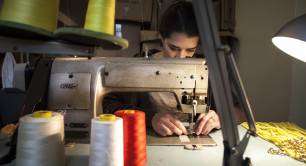Global Focus: An overview of social enterprise in Italy
The social economy landscape in Italy is rich, but fragmented. As Milan prepares to host the Social Enterprise World Forum, the woman at the helm, Elena Casolari, predicts the new government's positive stance will mobilise changes.
The social enterprise movement in Europe has been gathering momentum at a rapid pace over the past two decades. In Italy, 2015 marks a critical milestone in the movement.
Last year, Matteo Renzi became the youngest prime minister in the country’s history and by supporting the introduction of new social enterprise legislation has demonstrated his commitment to developing and promoting the social economy.
Elena Casolari, CEO of ACRA-CCS – the Italian NGO responsible for organising the 2015 Social Enterprise World Forum – says that the new government’s pro-social enterprise stance combined with the European Commission’s Social Business Initiative (SBI), which was set up in 2011, have resulted in “a wave of new interest and willingness to revive and foster the social enterprise sector”. The SBI has been working to improve the access to finance for social enterprises; for example, through the mobilisation of public money to create new funds, give more visibility to social enterprises and optimise the legal frameworks covering the sector across Europe.
In 2005, Italy passed a law on ‘imprese sociali’ (social enterprises) but it had a limited effect in increasing the number of organisations identifying themselves as a social enterprise. In a summary for the OECD, Professor Antonio Fici explains that the statute defines social enterprises as “private organisations” that are “performing an entrepreneurial activity of production of social utility goods and services”. They must also be “acting for the common interest” and be “not for profit” organisations.
According to the 2014 report from IRIS network (Istituto di Ricerca sull’Impresa Sociale), the total number of social enterprises recognised by the 2005 legislation and officially registered as social enterprises by the Italian equivalent of Companies House, Camera di Commercio, is 774.
A further 574 had not yet officially registered as social enterprises but contain the phrase ‘impresa sociale’ (social enterprise) in their company name. This relatively small number is largely due to the fact that ‘social cooperatives’, of which there are over 12,000, are not legally recognised as social enterprises.
Over the years the sector lost some steam because it didn’t change and adapt
Social cooperatives are an integral element of Italy’s social economy and the sector has been regarded as an example to countries all over the world. In 1991, the Act on Social Cooperatives was passed, legally recognising social cooperatives as organisations that operate primarily for the benefit of the community or groups of disadvantaged people. Social cooperatives must reinvest a minimum of 30% of their total profits back into the organisation, but are allowed to distribute just under 70%. No profits or other assets can be distributed if the co-operative is dissolved in order to prevent demutualisation of the organisation.
Casolari says that while the social cooperative sector in Italy is evidently one of the social economy’s greatest assets, “Over the years the sector lost some steam because it didn’t change and adapt”.
She continues: “They didn’t challenge themselves. Some of them didn’t understand that scale was important, or that it would be beneficial to go to market, become more self-sustainable and not be dependent on public tenders.”
The comparatively small ‘official’ social enterprise sector is also due to the lack of incentives for organisations to register themselves under this name. For example, social cooperatives receive certain tax reliefs; social enterprises do not. It is also safe to assume that many more social enterprises are operating in Italy that have not officially registered at the Camera di Commercio.
 View of Milan from the famous "Bela Madunina". Photo credit: Michela Ravasio
View of Milan from the famous "Bela Madunina". Photo credit: Michela Ravasio
This year discussions are underway to introduce new legislation that aims to make the social enterprise sector more effective. The process appears to be well advanced, with one of Italy’s two parliamentary chambers, the Camera dei Deputati, already voting positively in April. The reform redefines the nature of social enterprises, recognising both a ‘positive social impact’ and the notion of transparency as central values. The legislation also foresees the possibility of a partial (albeit strictly regulated) distribution of profits, and proposes to automatically apply the title of social enterprise to all social cooperatives.
Casolari explains: “The government is trying to merge the two different laws and see if there is a space for these two entities under the heading of social enterprise.
“Another development in discussion is about an expansion of the different sectors in which social enterprises can operate, for examples microcredit, fair trade and social housing. The new law has been approved and in the coming months there will be a specific elaboration of what it will mean for the sector.”
Changes are also being made to help Italy’s social enterprises and social cooperatives to take on investment – as is the case in many other parts of the world, most notably in the UK where the first social investment banks Big Society Capitals was founded in 2010.
“It has been very controversial and highly discussed at both government and civil society levels. Many are afraid this development will really change the nature of the background and integrity of the social economy here, and are very much against it,” explains Casolari.
“Many other players, who are very aware of the different challenges the social economy is facing, welcome this new development in the law. We will see new players, such as equity investors, coming in. Discussions are already taking place about the launches of various new funds.”
The social economy landscape here is very rich, despite being fragmented
For social entrepreneurs on the frontline, many of the challenges faced in Italy, from finding funding to navigating legal frameworks, resonate with those in other parts of the world. Italian social entrepreneur and co-founder of the social cooperative Progetto Quid Anna Fiscale describes the type of support she believes would boost the social enterprise sector.
“I think that both the private sector and government should provide start-ups and social enterprises with more dedicated support in terms of grants, seed funding and in providing information about basic business strategy such as how to register a trademark and develop a business plan," she says.
“I imagine an office specifically dedicated to supporting social entrepreneurs, based next to universities, where you can go and they will provide you with all this information.”
Whether or not such a vision becomes reality, without doubt the landscape for grassroots social ventures in Italy has been shifting on a fundamental level. In the past few years, Italian social entrepreneurs have not only witnessed changes in the law, but they have also celebrated a multiplicity of specially dedicated grant making and incubation opportunities. For example, the Milan City Council recently opened FabriQ, the incubator for social innovation managed by Fondazione Giacomo Brodolini and Impact Hub Milano; Unipolis, the foundation of the Unipol Group, launched ‘culturability’, an open platform for projects of social and cultural innovation; and the Fondazione Vodafone Italia, in collaboration with Banca Prossima, started an initiative called Building the Social Enterprise. All of these initiatives are running annual competitions for social entrepreneurs. They aim to ease access to funding or credit for social enterprises, to assist social ventures in their creation and growth, and to encourage a culture of social enterprise.
Sitting in her Milan office making plans for the 2015 Social Enterprise World Forum, which has returned to Europe for the first time in seven years, Casolari reflects: “The intentions from the government have been to make Italy’s social enterprise sector more inclusive and more competitive. “The social economy landscape here is very rich, despite being fragmented. There is plenty of experience to build on and a long history of social cooperatives from which to learn. The theme of this year’s forum is Growing a New Economy – reflecting the energy around social entrepreneurship globally.”
This article was originally published in Pioneers Post Quarterly, the printed edition of this magazine. To find out more about PPQ, including how to subscribe, click here.



